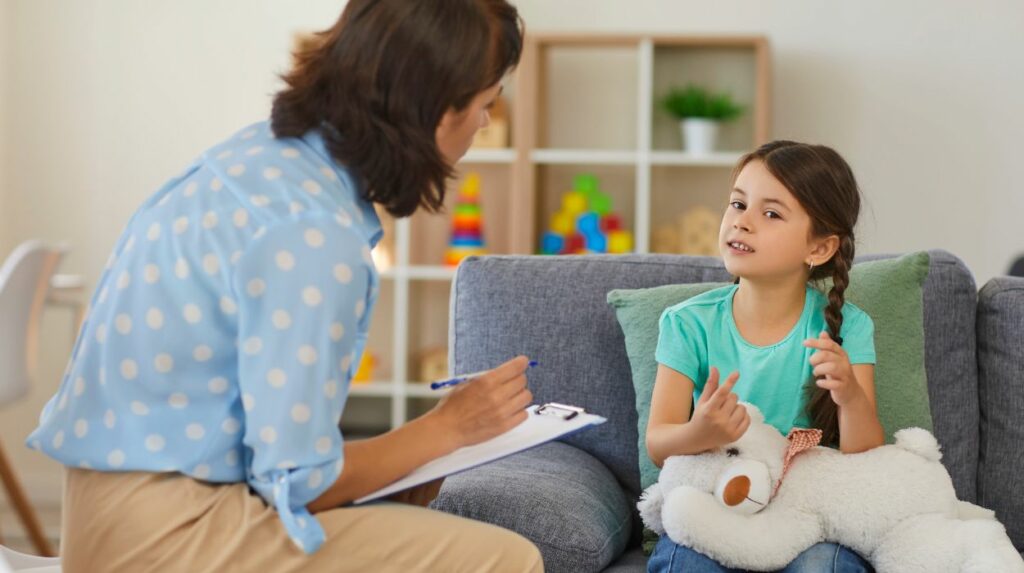How To Discipline A Child With ADHD: 7 Tips For Parents 2024

Raising a child with Attention Deficit Hyperactivity Disorder can be a wild ride. Discipline is an essential aspect of parenting. Still, it can often feel like a daunting task when it comes to effectively addressing a child’s behavior with ADHD.
From the constant hyperactivity to the inability to focus, it can feel like you’re constantly walking on eggshells. And when it comes to discipline, it can feel like you’re navigating a minefield. And there are no magic ADHD remedies to change negative behavior to make life easier.
However, the key lies in understanding ADHD and adapting your approach. Here, we’re going to dive deep into the world of ADHD parenting and give you the tools you need to discipline your child while supporting their unique needs effectively. We’ll share expert insights, practical strategies, and empathetic approaches to help you create a nurturing environment that fosters growth and self-esteem.
7 Discipline Strategies For Children With ADHD
Want to know how to discipline a child with ADHD? Here are seven ways on how to discipline a child with ADHD:
- Set clear expectations.
- Teach with patience.
- Use logical consequences.
- Avoid approaching the situation with anger.
- Try different approaches.
- Use positive reinforcement.
- Get professional help.
How To Discipline A Child With ADHD
Do you know how to discipline a child with ADHD? Here are seven simple parenting strategies for a child with ADHD.
Set Clear Expectations
Discipline does not involve yelling at ADHD children. There are better, easier ways to foster good behavior; the first is to set clear expectations. When setting clear expectations for a child with ADHD, it’s essential to consider several factors.
First, identify the behaviors and tasks you want your child to focus on. It could be completing homework, following family rules, or using good manners. Communicate these expectations using simple and concise language.
Remember, consistency is crucial, so try to ensure your expectations are the same across different settings and situations.
Teach With Patience

Another way to instill discipline in a child with ADHD is to approach the situation patiently. Patience allows you to create a supportive and nurturing environment where the child can develop their skills at their own pace.
This creates a positive learning environment and helps the child feel more comfortable. Remember that disciplining kids with ADHD may require more time to process information and respond. Give them time and space, and avoid rushing or pressuring them.
Use Logical Consequences
Using logical consequences is an effective way to discipline children with ADHD. Logical consequences help the child understand the cause-and-effect relationship between their behavior and the consequences that follow.
Logical consequences should be directly related to the behavior or action that led to them. For example, if a child refuses to clean up their toys, they may lose the privilege of playing with them for a period. They need to learn there are natural consequences to their bad behavior.
Also, logical consequences should be reasonable and not excessively harsh. Avoid imposing punishments that are too severe or may cause the child to feel ashamed. Yelling at ADHD children only forces them back into their shells, and it is better to just put them in time out for bad behavior.
Avoid Approaching The Situation With Anger
Approaching a situation with anger, especially when dealing with a child with ADHD, can be counterproductive and may escalate the issue. Instead, a calm and composed manner can create a more positive and effective outcome. Here are some tips for avoiding anger and maintaining a composed demeanor:
- Take a moment to gather your thoughts.
- Practice empathy.
- Control your tone of voice.
- Focus on the behavior, not the child.
- Offer guidance and support.
Try Different Approaches
ADHD manifests differently, so it’s essential to try various approaches when dealing with children with this condition. Each child is unique, and what works for one child might not be effective for another. ADHD can present itself through inattention, impulsivity, hyperactivity, or a combination of these symptoms. Recognize the specific ways ADHD affects the child to tailor the approach accordingly.
Use Positive Reinforcement

The best way to promote good behavior is to appreciate it. If you wonder how to discipline a child with ADHD, it is not a negative-only process. Using positive reinforcement when dealing with children, especially those with ADHD can be a highly effective strategy to encourage good behavior and build self-esteem.
When you notice your child displaying positive behavior or making an effort to improve, offer specific praise. Also, set up a reward system for achieving certain goals or completing tasks. These rewards include small treats, extra screen time, or a special outing. Make sure the rewards are appropriate for the child’s age and interests.
Get Professional Help
If you’re struggling with disciplining a child with ADHD, you should consider professional help, perhaps even an adolescent psychiatrist. They can provide tailored strategies and techniques to support the child’s needs. You can also sign up for online treatment to get the help you need at your convenience.
Why Parents Need To Discipline Children With ADHD
Attention-deficit/hyperactivity disorder is a common neurodevelopmental disorder. It is usually first diagnosed in childhood and often lasts into adulthood. ADHD is characterized by an ongoing pattern of inattention, hyperactivity, and impulsivity[1] that interferes with daily functioning. Children with ADHD may have difficulty paying attention. They may also exhibit controlling, impulsive behavior or be overly active. Currently, over 6 million children[2] ages 3-17 have been diagnosed with ADHD.
Why Do Children With ADHD Need Discipline?
Children with ADHD may have trouble paying attention in school.[3] They may neglect their priorities, such as completing homework on time and doing chores. This is because they’re easily distracted by things happening around them or their thoughts.
Discipline is needed to correct challenging behaviors. It’s not just about punishment – it’s also about teaching your child how to behave in the world. So, it’s important for parents to step in when necessary and guide how to handle situations like anger management or frustration tolerance.
Here are some reasons why positive parenting of a child with ADHD[4] is necessary:
- Establish structure and routine: Children with ADHD benefit from a consistent daily schedule, which helps them manage their behavior and stay focused on tasks.
- Teach self-regulation: Disciplining children with ADHD helps them learn to control their emotions and impulses. Control is essential for their growth and development.
- Improve social skills: Disciplining children with ADHD can help them develop better social skills, and they can interact more appropriately with their peers and adults.
- Encourage responsibility: Discipline teaches children with ADHD to be accountable for their actions and helps them understand the consequences of their behavior.
- Foster self-esteem and confidence: Consistent and fair discipline can boost a child’s self-esteem and confidence by providing them with clear expectations and a sense of accomplishment when they meet those expectations.
- Promote positive behavior: Discipline helps children with ADHD learn how to replace negative behaviors with positive ones, making it easier for them to function in various settings.
- Ensure safety: Disciplining children with ADHD can teach them to follow the rules and understand the importance of safety, reducing the risk of accidents and injuries.
- Strengthen the parent-child relationship: Parents who consistently and fairly discipline their children with ADHD can foster a stronger bond and mutual understanding, thus, leading to a healthier relationship.
Warnings & Safety Tips
When disciplining children with ADHD, it’s crucial to be delicate in the process. Here are some warnings and safety tips for disciplining ADHD children:
- Be patient and understanding.
- Avoid physical punishment.
- Be consistent with discipline.
- Focus on positive reinforcement.
- Tailor the discipline to the child’s needs.
- Avoid shaming or humiliation.
- Communicate clearly and calmly.
- Be mindful of the child’s emotional state.
- Seek professional support if it is beyond your control.
The Bottom Line
Children with ADHD are special. So, handling discipline with them and avoiding harsh punishment is often challenging. Still, with the right approach, it can be done effectively and safely. By understanding the unique needs and challenges of children with ADHD, parents, and caregivers can tailor their discipline methods to promote positive behaviors and emotional well-being.
+ 4 Sources
Health Canal avoids using tertiary references. We have strict sourcing guidelines and rely on peer-reviewed studies, academic researches from medical associations and institutions. To ensure the accuracy of articles in Health Canal, you can read more about the editorial process here
- CDC (2021). What is ADHD? [online] Centers for Disease Control and Prevention. Available at: https://www.cdc.gov/ncbddd/adhd/facts.html
- CDC (2022). Data and Statistics About ADHD. [online] Centers for Disease Control and Prevention. Available at: https://www.cdc.gov/ncbddd/adhd/data.html
- Sayal, K., Prasad, V., Daley, D., Ford, T. and Coghill, D. (2018). ADHD in children and young people: prevalence, care pathways, and service provision. The Lancet Psychiatry, [online] 5(2), pp.175–186. doi:https://doi.org/10.1016/s2215-0366(17)30167-0.
- Felt (2014). Diagnosis and management of ADHD in children. American family physician, [online] 90(7). Available at: https://pubmed.ncbi.nlm.nih.gov/25369623/



